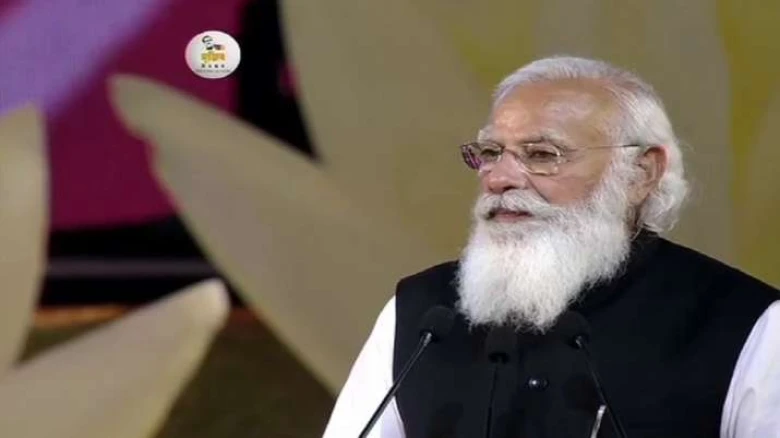Regional

This deal was a series of actions designed to get ahead of Bangladesh. Jan Sangh's main goals were to promote war despite the lack of preparation and to sway public opinion against the Indo-Soviet Treaty, which it argued was a "betrayal of Bangladesh."
color:#252525">
Digital Desk: The Prime Minister's Office (PMO) said it has no
record of Modi's detention in response to a Right to Information request about
the specifics of the incident, according to The Wire.
When visiting the National Martyrs' Memorial in Savar during
Bangladesh's 50th anniversary of independence, Modi was quoted as saying:
"When I, along with a few of my colleagues, participated in satyagraha
in support of Bangladesh's fight for independence, I must have been between 20
and 22 years old. While assisting in the fight for Bangladesh's independence, I
courted arrest and ended up in jail. "
At the time, numerous of Modi's opponents questioned the
validity of his claim, sparking a discussion.
Shuddhabrata Sengupta detailed how Jan Sangh organized a
"Recognize Bangladesh Satyagraha" action in Delhi from August 1–11,
1971. The movement culminated in a rally to oppose the India-USSR Treaty of
Friendship, which had been signed three days earlier on August 9, 1971.
This deal was a series of actions designed to get ahead of
Bangladesh. Jan Sangh's main goals were to promote war despite the lack of
preparation and to sway public opinion against the Indo-Soviet Treaty, which it
argued was a "betrayal of Bangladesh."
According to Sengupta, The Times of India had reported at the
time that Vajpayee had declared that the Indo-Soviet treaty meant "a
conspiracy between Delhi and Moscow to deny recognition to Bangladesh"
when speaking at a sizable gathering in Delhi on August 12, 1971.
Sengupta authored: "It is this "Satyagraha" that
Narendra Modi claims to have taken part in. He has previously discussed this
during a previous trip to Bangladesh, when he went to accept the nation's
highest civilian honour on behalf of the ailing Atal Behari Vaipayee (the
award's citation also mentions the Jan Sangh Satyagraha of August 1971)."
Sengupta had stated that it was also being asserted that Modi
had written this in the 1978 book Sangharshma Gujarat. Although the 2000 edition
of the book (which is available as a PDF on Modi's website) mentions
"imprisonment in Tihar Jail due to participation in Bangladesh
Satyagraha" in passing as one of the then-young author's
"achievements," native Gujarati speakers who have read it report that
it makes no mention of this.
On March 27, 2021, Jayesh Gurnani submitted his Right to
Information (RTI) application to the PMO in the middle of the controversy
surrounding Modi's assertion.
He had said that the application was related to the Prime Minister's
speech at Bangladesh's National Day programme, where he had asserted that he
had the chance to serve time in prison when he was between 20 and 22 years old
during the country's war for independence. As such, Gurnani sought information
on five specific points.
The applicant requested certified copies of the following
documents: the FIR filed at the relevant police station listing Modi as an
accused party; the arrest memo or any other pertinent document on his arrest;
the documents showing his release from jail; and the documents stating the name
of the jail where he was kept.
However, the PMO was unable to give Gurnani a particular
response. Only the following was mentioned: "The material as accessible on
records may be obtained on the PMO website under the hyperlink "PM's
Speeches"." The PMO further clarified that it "maintains
official documents of Shri Narendra Modi since he assumed the position of Prime
Minister of India in 2014."
The petitioner had made a first appeal to the First Appellate
Authority (FAA)/Director in the PMO because he was dissatisfied with the
response.
The latter answered on June 15, 2021, stating that the appellant
had claimed that no information had been given to him in the appeal that was
submitted on May 4, 2021. The Chief Public Information Officer (CPIO) of the
PMO, according to the FAA, posted a response online on June 4, 2021; therefore,
the appeal came first. As a result, he rejected the appeal and stated, "No
further action is required on your appeal."
Gurnani then went to the Information Commission, where Chief
Information Commissioner YK Sinha heard the case. On August 18, 2022, the
Commission conducted a video conference hearing in this regard.
The appellant stated during the hearing that he had filed the
complaint on the basis that there was a considered refusal to provide
information since no reply had been sent within the allotted 30 days, according
to Sinha's ruling in the case. The COVID-19 pandemic, according to the PMO's
CPIO and Deputy Secretary (RTI), hindered the organization's ability to
function administratively, which is why it took so long to respond to the RTI
application and the initial appeal.
According to Sinha's order, the Commission was merely needed to
determine whether the material had been withheld with malicious intent or for
an arbitrary reason, which it was unable to do in the current situation. In
light of this, he dismissed the appeal.
Leave A Comment